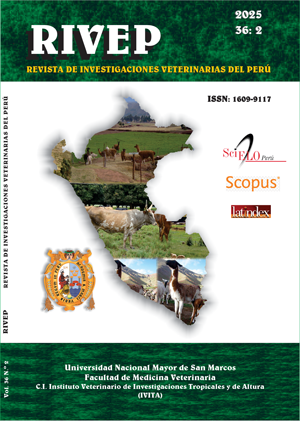Antibacterial potential of Cyrtocarpa procera on pathogens that affect Veterinary Medicine and Public Health
DOI:
https://doi.org/10.15381/rivep.v36i2.28044Keywords:
Cyrtocarpa procera, pulp, seed, leaf, Minimum Inhibitory Concentration, Minimum Bactericidal ConcentrationAbstract
The in vitro antibacterial activity of three hydroalcoholic extracts obtained from the pulp, seed and leaf of Cyrtocarpa procera against bacteria ATCC (American Type Culture Collection) and isolated from clinical cases of importance in veterinary and public health was evaluated. The extracts were obtained by maceration in a hydroalcoholic solution (70:30, water: methanol). The content of total phenolic compounds was determined in the extracts. The antibacterial activity was determined by the Minimum Inhibitory Concentration (MIC) and Minimum Bactericidal Concentration (MBC). The extracts were evaluated at concentrations from 200 to 1.56 mg/mL. The seed extract had a better effect inhibiting bacterial growth on reference strains and those isolated from clinical cases (MIC: 6.25-25 mg/mL), as well as causing bacterial death with MBC of 25-200 mg/mL. The bactericidal effect of the hydroalcoholic extract of C. procera seed was evident over 8/13 bacteria evaluated both ATCC and isolated from clinical cases.
Downloads
Downloads
Published
Issue
Section
License
Copyright (c) 2025 Xochitl De Jesús-Martínez, Adrián Zaragoza-Bastida, Agustín Olmedo-Juárez, Benjamín Valladares-Carranza, Jaime Olivares-Pérez, María Eugenia López-Arellano, Nallely Rivero-Perez

This work is licensed under a Creative Commons Attribution 4.0 International License.
AUTHORS RETAIN THEIR RIGHTS:
a. Authors retain their trade mark rights and patent, and also on any process or procedure described in the article.
b. Authors retain their right to share, copy, distribute, perform and publicly communicate their article (eg, to place their article in an institutional repository or publish it in a book), with an acknowledgment of its initial publication in the Revista de Investigaciones Veterinarias del Perú (RIVEP).
c. Authors retain theirs right to make a subsequent publication of their work, to use the article or any part thereof (eg a compilation of his papers, lecture notes, thesis, or a book), always indicating the source of publication (the originator of the work, journal, volume, number and date).



